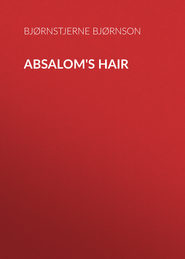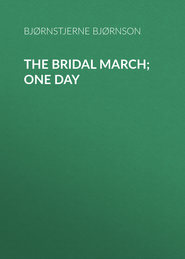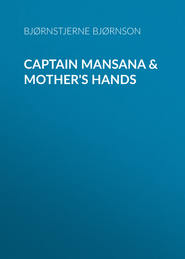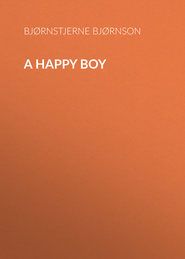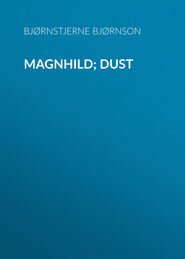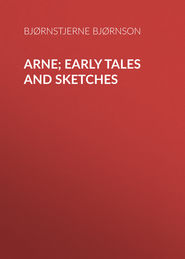По всем вопросам обращайтесь на: info@litportal.ru
(©) 2003-2024.
✖
Three Comedies
Автор
Год написания книги
2019
Настройки чтения
Размер шрифта
Высота строк
Поля
Leonarda. And was that all?
Aagot. All? It happened out of doors amongst all the people.
Leonarda. Aagot!
Aagot. It happened so frightfully unexpectedly. I never was so frightened in my life—and so ashamed of myself afterwards. I did nothing but cry on the boat, all the way.
Leonarda. But he must have come by the same boat.
Aagot. Just fancy, he had travelled overland across the promontory and caught the boat on the other side. And I knew nothing about it till I saw him before my eyes! I thought I should sink through the deck. I wanted to run away then, but—oh, aunt, I couldn't! He looked at me with such a wonderful look in his eyes, and took hold of my hands. He spoke to me, but I don't know what he said; everything seemed to be going round and round. And his eyes, aunt! Ah, you haven't looked at them, and that is why you took it so—so—
Leonarda. No, dear.
Aagot. There is something about his mere presence—something so true. And when he looks at me and says—not in words, you know, but still says all the same "I love you so much," I tremble all over. Oh, aunt, kiss me!—There! Thank heaven!—Do you know what he said to-day?
Leonarda. No.
Aagot. That the woman who had fostered—that was the word he used—such a solemn word, but then he is studying for the church—well, that the woman who had fostered such a girl—he meant me, you know—I thought of all my faults, but he will get to know them soon enough—
Leonarda. Well? That the woman who had fostered such a girl as you—
Aagot.—as me, could not have her equal anywhere!
Leonarda. You must have been praising me up nicely?
Aagot. On the contrary. It was afterwards when he said he would come here first, before me—it was his duty, he said, to stand the first shock. "For heaven's sake don't," I said; "you don't know her, she will crush you!"
Leonarda. Oh, Aagot!
Aagot. It was then that he said, "No, the woman who has fostered such a girl," etcetera, etcetera. Ah, now I see you have been horrid to him.
Leonarda. I had been worried all the morning—and I misunderstood—
Aagot. You shall have no more worries after this. Because people are so kind, you know, and you are going to move about among them again. You, who are so good yourself—
Leonarda. No, that is just what I am not.
Aagot. You? You are only so very difficult to understand, aunt!—Oh, what is it, dear?
Leonarda. I am unhappy, Aagot!
Aagot. Why, aunt? About me?
Leonarda. You are the sunshine of my life; you have brought light and warmth and gentleness into it—but it is just because of that—
Aagot. Because of that? Aunt, I don't understand you.
Leonarda. I am clumsy, I am hard, I am suspicious—wicked. I am a savage, with no more self-restraint than I ever had. What sort of a figure must I cut in his eyes—and in yours? Tell me! Am I not a clumsy, ugly—
Aagot. You are the sweetest woman in the whole work! It is only your indomitable strength and courage and youthfulness—
Leonarda. No, no—tell me the truth! I deserve it! Because, you know, it has been for your sake that for eight years I have only associated with work-people. All that I have will be yours. So have some respect for me, Aagot—tell me the truth! Am I not—what shall I say? Tell me what I am!
Aagot. Adorable!
Leonarda. No, no! I have never realised as strongly as I do now how I have buried myself all these eight years. All the books I have read about the great movements going on in the world outside have not really enlightened me. All that I have read and thought fades away before the first gleam of life that reaches me from the real world of men and women. I see new beauty merely in your new clothes, your fashionable hat—the colours you are wearing—the way they are blended. They mean something that I know nothing of. You bring a fragrance in with you—a breath of freshness; you are so dainty and full of life; whereas everything here has become so old, so heavy, so disjointed—and my life most of all.
Aagot. Well, I must tell you what he said, since you won't believe what I say.
Leonarda. But he knew nothing about me?
Aagot. No—it only indirectly referred to you. He said he had never wanted so much to get to know any one, as he wanted to get to know you, because seeing much of me had made him discover you—that was the very expression he used! And it was an extraordinary chance that—
Leonarda. Stop! I can't bear to think of it!—To think it should be the very man whom we—we—
Aagot. Hated so!—yes, isn't it extraordinary?
Leonarda. The very first time you have been away from me!
Aagot. Yes!
Leonarda. And you come back in a halo of reconciliation and affection for him!
Aagot. But who is responsible for that, I should like to know! And you talk about your life here having made you clumsy and ugly—you, who can manufacture a goddess of victory like me!
Leonarda. No, I don't complain when I see you and hear you—when I have you with me! That is worth paying a price for. It was selfish of me to think for a moment that the price was too high. You are in the springtime of your life—while I—
Aagot. You? What is wrong with your life?
Leonarda. I am beginning to think my life is over.
Aagot. Yours? Your life over? Oh, you pain me by saying such a thing.
Leonarda. I am very happy—very happy about all this! Believe me that is so. But you know—
Aagot. I know how tremendously and incomprehensibly you have changed!
Leonarda. Go, my child—and bring him back!
Aagot. How delicious that sounds! Bring him back! (Gets up, then stops.) Thank you, my dear, sweet, darling aunt! (She runs out. LEONARDA falls into a chair by the table and buries her head in her hands. AAGOT'S voice is heard without: "Yes, come along!" and HAGBART'S, answering: "Is it true?")
Aagot (coming in with HAGBART). Come along! (LEONARDA gets up, dries her eyes, and meets them with a smile.) Aunt, here he is!
Hagbart. Mrs. Falk!
Leonarda. Forgive me!
Hagbart. What?—No, you must forgive me! I haven t been able to ask you to! I—
Aagot. All? It happened out of doors amongst all the people.
Leonarda. Aagot!
Aagot. It happened so frightfully unexpectedly. I never was so frightened in my life—and so ashamed of myself afterwards. I did nothing but cry on the boat, all the way.
Leonarda. But he must have come by the same boat.
Aagot. Just fancy, he had travelled overland across the promontory and caught the boat on the other side. And I knew nothing about it till I saw him before my eyes! I thought I should sink through the deck. I wanted to run away then, but—oh, aunt, I couldn't! He looked at me with such a wonderful look in his eyes, and took hold of my hands. He spoke to me, but I don't know what he said; everything seemed to be going round and round. And his eyes, aunt! Ah, you haven't looked at them, and that is why you took it so—so—
Leonarda. No, dear.
Aagot. There is something about his mere presence—something so true. And when he looks at me and says—not in words, you know, but still says all the same "I love you so much," I tremble all over. Oh, aunt, kiss me!—There! Thank heaven!—Do you know what he said to-day?
Leonarda. No.
Aagot. That the woman who had fostered—that was the word he used—such a solemn word, but then he is studying for the church—well, that the woman who had fostered such a girl—he meant me, you know—I thought of all my faults, but he will get to know them soon enough—
Leonarda. Well? That the woman who had fostered such a girl as you—
Aagot.—as me, could not have her equal anywhere!
Leonarda. You must have been praising me up nicely?
Aagot. On the contrary. It was afterwards when he said he would come here first, before me—it was his duty, he said, to stand the first shock. "For heaven's sake don't," I said; "you don't know her, she will crush you!"
Leonarda. Oh, Aagot!
Aagot. It was then that he said, "No, the woman who has fostered such a girl," etcetera, etcetera. Ah, now I see you have been horrid to him.
Leonarda. I had been worried all the morning—and I misunderstood—
Aagot. You shall have no more worries after this. Because people are so kind, you know, and you are going to move about among them again. You, who are so good yourself—
Leonarda. No, that is just what I am not.
Aagot. You? You are only so very difficult to understand, aunt!—Oh, what is it, dear?
Leonarda. I am unhappy, Aagot!
Aagot. Why, aunt? About me?
Leonarda. You are the sunshine of my life; you have brought light and warmth and gentleness into it—but it is just because of that—
Aagot. Because of that? Aunt, I don't understand you.
Leonarda. I am clumsy, I am hard, I am suspicious—wicked. I am a savage, with no more self-restraint than I ever had. What sort of a figure must I cut in his eyes—and in yours? Tell me! Am I not a clumsy, ugly—
Aagot. You are the sweetest woman in the whole work! It is only your indomitable strength and courage and youthfulness—
Leonarda. No, no—tell me the truth! I deserve it! Because, you know, it has been for your sake that for eight years I have only associated with work-people. All that I have will be yours. So have some respect for me, Aagot—tell me the truth! Am I not—what shall I say? Tell me what I am!
Aagot. Adorable!
Leonarda. No, no! I have never realised as strongly as I do now how I have buried myself all these eight years. All the books I have read about the great movements going on in the world outside have not really enlightened me. All that I have read and thought fades away before the first gleam of life that reaches me from the real world of men and women. I see new beauty merely in your new clothes, your fashionable hat—the colours you are wearing—the way they are blended. They mean something that I know nothing of. You bring a fragrance in with you—a breath of freshness; you are so dainty and full of life; whereas everything here has become so old, so heavy, so disjointed—and my life most of all.
Aagot. Well, I must tell you what he said, since you won't believe what I say.
Leonarda. But he knew nothing about me?
Aagot. No—it only indirectly referred to you. He said he had never wanted so much to get to know any one, as he wanted to get to know you, because seeing much of me had made him discover you—that was the very expression he used! And it was an extraordinary chance that—
Leonarda. Stop! I can't bear to think of it!—To think it should be the very man whom we—we—
Aagot. Hated so!—yes, isn't it extraordinary?
Leonarda. The very first time you have been away from me!
Aagot. Yes!
Leonarda. And you come back in a halo of reconciliation and affection for him!
Aagot. But who is responsible for that, I should like to know! And you talk about your life here having made you clumsy and ugly—you, who can manufacture a goddess of victory like me!
Leonarda. No, I don't complain when I see you and hear you—when I have you with me! That is worth paying a price for. It was selfish of me to think for a moment that the price was too high. You are in the springtime of your life—while I—
Aagot. You? What is wrong with your life?
Leonarda. I am beginning to think my life is over.
Aagot. Yours? Your life over? Oh, you pain me by saying such a thing.
Leonarda. I am very happy—very happy about all this! Believe me that is so. But you know—
Aagot. I know how tremendously and incomprehensibly you have changed!
Leonarda. Go, my child—and bring him back!
Aagot. How delicious that sounds! Bring him back! (Gets up, then stops.) Thank you, my dear, sweet, darling aunt! (She runs out. LEONARDA falls into a chair by the table and buries her head in her hands. AAGOT'S voice is heard without: "Yes, come along!" and HAGBART'S, answering: "Is it true?")
Aagot (coming in with HAGBART). Come along! (LEONARDA gets up, dries her eyes, and meets them with a smile.) Aunt, here he is!
Hagbart. Mrs. Falk!
Leonarda. Forgive me!
Hagbart. What?—No, you must forgive me! I haven t been able to ask you to! I—






